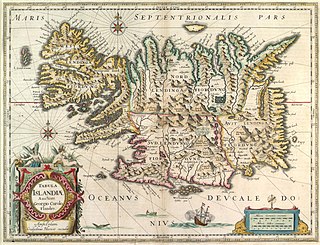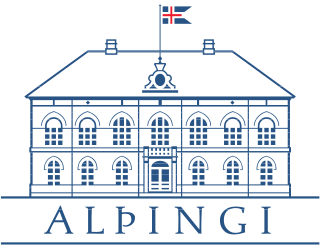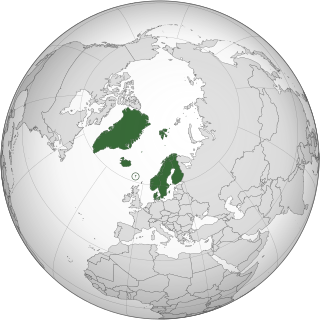
Iceland is a Nordic island country between the North Atlantic and Arctic Oceans, on the Mid-Atlantic Ridge between North America and Europe. It is linked culturally and politically with Europe and is the region's most sparsely populated country. Its capital and largest city is Reykjavík, which is home to about 36% of the country's roughly 380,000 residents. The official language of the country is Icelandic.

Old Norse, Old Nordic, or Old Scandinavian is a stage of development of North Germanic dialects before their final divergence into separate Nordic languages. Old Norse was spoken by inhabitants of Scandinavia and their overseas settlements and chronologically coincides with the Viking Age, the Christianization of Scandinavia and the consolidation of Scandinavian kingdoms from about the 8th to the 15th centuries.

Reykjavík is the capital and largest city of Iceland. It is located in southwestern Iceland, on the southern shore of Faxaflói bay. Its latitude is 64°08′ N, making it the world's northernmost capital of a sovereign state. Reykjavík has a population of around 140,000 as of 2023. The Capital Region has a population of around 248,000.

The recorded history of Iceland began with the settlement by Viking explorers and the people they enslaved from Western Europe, particularly in modern-day Norway and the British Isles, in the late ninth century. Iceland was still uninhabited long after the rest of Western Europe had been settled. Recorded settlement has conventionally been dated back to 874, although archaeological evidence indicates Gaelic monks from Ireland, known as papar according to sagas, may have settled Iceland earlier.

Erik Thorvaldsson, known as Erik the Red, was a Norse explorer, described in medieval and Icelandic saga sources as having founded the first European settlement in Greenland. Erik most likely earned the epithet "the Red" due to the color of his hair and beard. According to Icelandic sagas, Erik was born in the Jæren district of Rogaland, Norway, as the son of Thorvald Asvaldsson; to which Thorvald would later be banished from Norway, and would sail west to Iceland with Erik and his family. During Erik's life in Iceland, he married Þjódhild Jorundsdottir and would have four children, with one of Erik's sons being the well-known Icelandic explorer Leif Erikson. Around the year of 982, Erik was exiled from Iceland for three years, during which time he explored Greenland, eventually culminating in his founding of the first successful European settlement on the island. Erik would later die there around 1003 CE during a winter epidemic.

The Alþingi, anglicised as Althingi or Althing, is the supreme national parliament of Iceland. It is one of the oldest surviving parliaments in the world. The Althing was founded in 930 at Þingvellir, situated approximately 45 kilometres (28 mi) east of what later became the country's capital, Reykjavík. After Iceland's union with Norway in 1262, the Althing lost its legislative power, which was not restored until 1903 when Iceland gained Home Rule from Denmark. For 641 years, the Althing did not serve as the parliament of Iceland, ultimately power rested with the Norwegian, and subsequently the Danish throne. Even after Iceland's union with Norway in 1262, the Althing still held its sessions at Þingvellir until 1800, when it was discontinued. It was restored in 1844 by royal decree and moved to Reykjavík. The restored unicameral legislature first came together in 1845 and after 1874 operated in two chambers with an additional third chamber taking on a greater role as the decades passed until 1991 when Althing became once again unicameral. The present parliament building, the Alþingishús, was built in 1881, made of hewn Icelandic stone. The unicameral parliament has 63 members, and is elected every four years based on party-list proportional representation. The current speaker of the Althing is Birgir Ármannsson.

The northern region of Europe has several definitions. A restrictive definition may describe Northern Europe as being roughly north of the southern coast of the Baltic Sea, which is about 54°N, or may be based on other geographical factors such as climate and ecology.
The Cod Wars were a series of 20th-century confrontations between the United Kingdom and Iceland about fishing rights in the North Atlantic. Each of the disputes ended with an Icelandic victory.
Sagas are prose stories and histories, composed in Iceland and to a lesser extent elsewhere in Scandinavia.
The music of Iceland includes vibrant folk and pop traditions, as well as an active classical and contemporary music scene. Well-known artists from Iceland include medieval music group Voces Thules, alternative rock band The Sugarcubes, singers Björk, Laufey, Daði Freyr, Hafdís Huld and Emiliana Torrini, post-rock band Sigur Rós, post-metal band Sólstafir, indie folk/indie pop band Of Monsters and Men, blues/rock band Kaleo, metal band Skálmöld and techno-industrial band Hatari. Iceland's traditional music is related to Nordic music forms. Although Iceland has a very small population, it is home to many famous and praised bands and musicians.

Icelandic names are names used by people from Iceland. Icelandic surnames are different from most other naming systems in the modern Western world in that they are patronymic or occasionally matronymic: they indicate the father of the child and not the historic family lineage. Iceland shares a common cultural heritage with the Scandinavian countries of Denmark, Norway, and Sweden. Unlike these countries, Icelanders have continued to use their traditional name system, which was formerly used in most of Northern Europe. The Icelandic system is thus not based on family names. Generally, with few exceptions, a person's last name indicates the first name of their father (patronymic) or in some cases mother (matronymic) in the genitive, followed by -son ("son") or -dóttir ("daughter").

Icelanders are an ethnic group and nation who are native to the island country of Iceland. They speak Icelandic, a North Germanic language.

The Iceland national football team represents Iceland in men's international football. The team is controlled by the Football Association of Iceland, and have been a FIFA member since 1947 and a UEFA member since 1957. The team's nickname is Strákarnir okkar, which means Our Boys in Icelandic.

The Icelandic Coast Guard is the Icelandic defence service responsible for search and rescue, maritime safety and security surveillance, national defense, and law enforcement. The Coast Guard maintains the Iceland Air Defence System which conducts ground-based surveillance of Iceland's air space and operate Keflavik airbase. It is also responsible for hydrographic surveying and nautical charting.

The FootballAssociation of Iceland is the governing body of football in Iceland. It was founded on 26 March 1947, joined FIFA the same year, and UEFA in 1954. It organises the football league, Úrvalsdeild, and the Iceland men's national football team and Iceland women's national football team. It is based in Reykjavík.

The Kingdom of Iceland was a sovereign and independent country under a constitutional and hereditary monarchy that was established by the Act of Union with Denmark signed on 1 December 1918. It lasted until 17 June 1944 when a national referendum established the republic of Iceland in its place.

Icelandic is a North Germanic language spoken by about 314,000 people, the vast majority of whom live in Iceland, where it is the national language. Since it is a West Scandinavian language, it is most closely related to Faroese, western Norwegian dialects, and the extinct language Norn. It is not mutually intelligible with the continental Scandinavian languages and is more distinct from the most widely spoken Germanic languages, English and German. The written forms of Icelandic and Faroese are very similar, but their spoken forms are not mutually intelligible.

The Nordic countries are a geographical and cultural region in Northern Europe and the North Atlantic. It includes the sovereign states of Denmark, Finland, Iceland, Norway and Sweden; the autonomous territories of the Faroe Islands and Greenland; and the autonomous region of Åland.
Þórólfur Guðnason is an Icelandic doctor who serverd as the Chief Epidemiologist of the Icelandic Directorate of Health from 2015 to 2022. He was one of the lead members of the Iceland's Department of Civil Protection and Emergency Management addressing the COVID-19 pandemic in Iceland, along with Alma Möller and Víðir Reynisson.
COVID-19 vaccination in Iceland is an effort to immunize the adult population of Iceland due to the COVID-19 pandemic. As of July 2021, more than 260,000 individuals had received at least one dose of COVID-19 vaccine, which was over 78% of the country's population. On November 21, 2021, 90% of the target population had been fully vaccinated, while around 1 in 5 people had received a booster on top of that; by December 9, 2021, the share of the population having received a booster shot exceeded 50%. On December 13, 2021, the country began offering Pfizer vaccinations to children aged 5–11.















